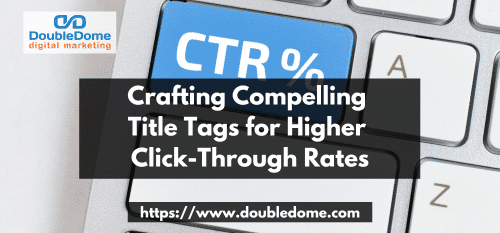Crafting effective title tags is a critical aspect of search engine optimization (SEO) that can significantly impact your website’s click-through rates (CTR). Title tags are HTML elements that define the title of a webpage and appear as clickable headlines on search engine result pages (SERPs). In this article, we will explore strategies and techniques to create compelling title tags that not only improve your SEO but also entice users to click and visit your website.

1. Understanding the Importance of Title Tags
Title tags serve as the first point of contact between your website and potential visitors. They provide a concise summary of the content and purpose of your web pages. Effective title tags not only influence search engine rankings but also play a crucial role in attracting users to click on your website from the search results.
2. Utilizing Keyword Research
Keyword research is a fundamental step in crafting compelling title tags. By understanding the keywords and phrases users are searching for, you can optimize your titles to align with their intent. Begin by identifying relevant keywords and long-tail variations that are both popular and relevant to your content.
3. Incorporating Focus Keywords
Focus keywords are the primary keywords that represent the core theme or subject of your webpage. Including these keywords in your title tags is crucial for search engines to understand the relevance of your content. Place your focus keywords at the beginning of your title tag to enhance visibility and emphasize relevance.
4. Maintaining an Appropriate Length
Title tags have a maximum recommended length of approximately 50-60 characters. Ensure that your title tags are concise, descriptive, and accurately reflect the content of your webpage. Longer title tags may get truncated on SERPs, leading to a loss of important information and decreased click-through rates.
5. Engaging Users with Power Words
Power words are attention-grabbing terms that evoke emotions or curiosity in readers. Incorporating powerful words into your title tags can make them more compelling and increase the likelihood of clicks. Some examples of power words include “ultimate,” “essential,” “proven,” “exclusive,” and “secret.”
6. Creating Unique and Descriptive Titles
To stand out from the competition and attract users, it’s crucial to craft unique and descriptive title tags. Avoid generic titles that don’t provide much information. Instead, focus on creating titles that accurately describe the content while also piquing the reader’s interest.
7. Evoking a Sense of Urgency
By incorporating a sense of urgency in your title tags, you can motivate users to click immediately. Words like “limited time offer,” “don’t miss out,” or “act now” can create a sense of urgency and drive users to take immediate action.
8. Optimizing for Local SEO
If your business operates locally, it’s essential to optimize your title tags for local SEO. Include location-specific keywords in your titles to target users in specific geographical areas. This practice can significantly increase click-through rates from users who are searching for local businesses or services.
9. A/B Testing and Iteration
A/B testing is a valuable technique to optimize your title tags for higher click-through rates. Create multiple variations of your title tags and monitor their performance using analytics tools. Analyze the results and iterate based on the data to refine and improve your title tags over time.
Frequently Asked Questions (FAQs)
How many characters should a title tag ideally have?
The recommended length for a title tag is approximately 50-60 characters. However, search engines may truncate longer titles, so it’s essential to keep them concise and descriptive.
Should I include my focus keywords in the title tag?
Yes, including your focus keywords in the title tag is crucial for search engines to understand the relevance of your content. Place them at the beginning of the tag for better visibility.
Can power words improve the click-through rates of my title tags?
Absolutely! Powerful words evoke emotions and curiosity in readers, making your title tags more compelling. Incorporate relevant power words to increase the likelihood of clicks.
How can I optimize title tags for local SEO?
To optimize title tags for local SEO, include location-specific keywords in your titles. This helps target users in specific geographical areas and increases local search visibility.
Why is A/B testing important for title tags?
A/B testing allows you to create variations of your title tags and compare their performance. By analyzing the results, you can iterate and optimize your titles for higher click-through rates.
Conclusion
Crafting compelling title tags is a crucial aspect of SEO that can drive higher click-through rates and improve the visibility of your website on search engine result pages. By incorporating relevant keywords, and power words, and maintaining an appropriate length, you can create titles that not only attract users but also improve your website’s ranking. Remember to constantly monitor and optimize your title tags to stay ahead of the competition and achieve better organic traffic.








